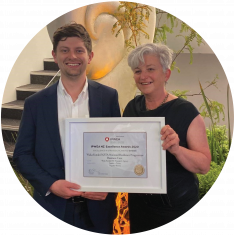Background to the project: With growing demands on the land transport system and an increasing risk posed by climate change and natural hazards, resilience is becoming increasingly important as both a network asset and an organisational characteristic.
Waka Kotahi commissioned the development of the National Resilience Programme Business Case to improve how resilience is embedded into its future planning and investment decisions for the New Zealand land transport system.
This was a great opportunity to integrate skills across a range of specialist disciplines to deliver an integrated product that would deliver value to New Zealand. - Sue Powell
Tonkin + Taylor and Tregaskis Brown were engaged to develop the Business Case and its associated outputs. The project team consisted of Richard Reinen-Hamill, Chris Purchas, James Hughes, Rebekah Robertson, Alex Cartwright from Tonkin + Taylor and Sue Powell and Andrew Logie from Tregaskis Brown.
What do we mean by resilience?: Resilience in the land transport context is defined by Waka Kotahi as the system’s ability to enable communities to withstand and absorb impacts of unplanned disruptive events, perform effectively during disruptions, and respond and recover functionality quickly. Resilience requires minimising and managing the consequences of small and large scale, frequent and infrequent, sudden and slow-onset disruptive events, caused by natural hazards.
The case: The key outputs of the National Resilience Programme Business Case were:
Approach to the project: Three key elements utilised by the Tonkin + Taylor and Tregaskis Brown team for this project were critical to its success:
A collaborative approach: New Zealand’s land transport system includes many long-lived assets that are owned, managed and operated by multiple entities each of whom have different roles to play to ensure the system functions and delivers the services that users and communities require.
An important element to developing the Business Case was ensuring it was done as a collaborative exercise. The team identified three distinct stakeholder groups to help build the Case:
National level stakeholders: This group included senior representatives from agencies with a major interest in developing resilience, and who have experienced the challenges that a lack of resilience can pose. This group was engaged to help frame the Case and ensure that it delivered against broader government objectives.
Planning and development stakeholders: This group included agencies with a strategic view in managing existing and future resilience challenges associated with the land transport system. This group was involved in helping understand the resilience challenges and confirm the outputs of the Business Case.
Regional stakeholder groups: This group included representatives from agencies across 12 regions throughout New Zealand with local expertise and knowledge of resilience challenges facing the land transport system (e.g. local network managers and maintenance staff). This group was engaged to help construct the evidence base of natural hazard risks and potential resilience interventions to mitigate these risks.
Engaging stakeholders across these three distinct groups ensured that both future and legacy resilience issues were well investigated. It also ensured there was broad acceptance of the outputs of this Business Case across the system, promoting the use of the outputs for future planning.
Community outcomes being central to the business case: A safe, well-connected and accessible land transport system is critical to the health and wellbeing of all New Zealanders and it underpins our economy.
The focus of the Business Case was therefore framed around:
This focus ensured that the outputs of the Business Case were centred around better protecting communities from impacts and outages caused by natural hazards and allowing them to be more resilient when events do occur.
Understanding physical and systemic resilience risks across the land transport system: The evidence base produced through this Business Case is the first time Waka Kotahi can confidently express a nationally consistent, objective and representative view of physical and systemic resilience risks across the land transport system. The evidence base is now used by Waka Kotahi and its co-investment partners to assess and compare risk across different hazards for a complex system.
Leading the engagement across 12 different regions in New Zealand, Tonkin + Taylor developed an online geospatial viewer and data capture tool to capture information in an efficient, systematic, and transparent manner. The tool helped to increase the consistency of data across the regions.
The project the team also became aware that there were a number of systemic issues that were inhibiting the ability to address/invest in resilience projects for the land transport system. The team therefore ensured that the Case responded to these challenges as well through a suite of system responses.
Download PDF
Sue Powell
Consulting Partner
Measures of success: In May 2020, the Waka Kotahi NZ Transport Agency Board endorsed the Business Case and some of the suggested resilience interventions proposed through the Case were included in the National Land Transport Plan. Inclusion of these projects demonstrated that Waka Kotahi were in a much better position to justify investment into improving the resilience of the land transport system and the resilience of all communities which rely on the network, as obtaining investment for resilience projects had previously been adhoc and generally unsuccessful.
In December 2020 the Waka Kotahi, Tonkin + Taylor and Tregaskis Brown team won an award from the Institute of Public Works Engineering of Australasia in 2020 for excellence in strategic planning.

If you want to know more about this mahi check out the Waka Kotahi website, which has a page dedicated to the National Resilience Programme Business Case here.